What Is Menopause?

What is menopause like? Menopause is not a disease, but rather the point in a woman's life at which she is no longer fertile, and menstrual periods have ceased. During this time, ovulation stops and estrogen hormones drop. Menopause can be accompanied by physical symptoms in some women, like hot flashes or night sweats. Menopause is the time point at which a woman has not had a menstrual period for 12 months. Perimenopause is the time leading up to menopause, and the symptoms of the transition can take two to ten years. Menopause can be seen as a positive beginning of a new phase of life, with opportunities to take preventive action against major health risks.
Menopause Causes

Age is the most common factor that influences menopause. The ovaries gradually lose their ability to produce hormones and ovulate with advancing age. There are other causes of menopause, since some surgeries and medical treatments can induce menopause. These causes include removal of the ovaries, chemotherapy for cancer, and radiation therapy to the pelvis.
When the uterus is removed (hysterectomy) without removing the ovaries in a premenopausal woman, menstrual periods cannot occur, but the hormonal changes characteristic of menopause will not occur.
When Does Menopause Start?

The average age for natural menopause is 51, but it can occur earlier or later. Rarely, women may reach menopause as early as 40 or as late as 60 years of age. Women who smoke cigarettes tend to have earlier menopause than nonsmoking women. There is no way to predict in advance precisely when a particular woman will reach menopause. Menopause is confirmed when a woman has not had menstrual periods for 12 consecutive months.
How Long Does Menopause Last?
The beginning of perimenopause to the time of menopause typically lasts two to eight years. Some women go through the transition quicker than others.
What is Perimenopause?

The transition to menopause and the time approaching menopause are referred to as perimenopause. Perimenopause means “time around menopause”. During this time the ovaries are still working, but their function has started to decrease. It’s still possible for a woman to become pregnant, even if she is showing signs of perimenopause, because she may still ovulate. Estrogen levels also rise and fall during this time.
Perimenopause Symptoms

Perimenopause symptoms vary from woman to woman. Menstrual irregularity (irregular periods) is a common symptom that women may experience during perimenopause.
List of Perimenopause Symptoms
- Hot flashes
- Breast tenderness
- Worsening of premenstrual syndrome
- Lower sex drive
- Fatigue
- Irregular periods
- Vaginal dryness
- Urine leakage when coughing or sneezing
- Urinary urgency
- Mood swings
- Trouble sleeping
Consult your doctor if you are experiencing any of the following symptoms, since perimenopause might not be the cause:
- Periods are very heavy, or have blood clots
- Periods last several days longer than usual
- Spotting between periods
- Spotting after sex
- Periods happen closer together
Signs of Menopause: Period Changes
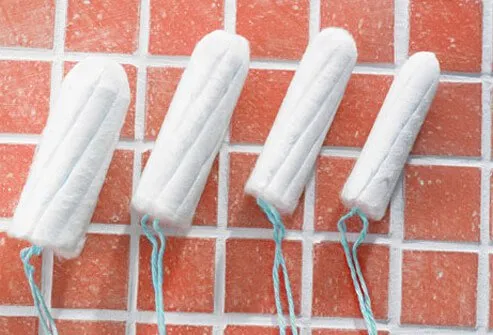
With approaching menopause, a woman’s menstrual periods may change. They may get shorter or longer, lighter, or heavier. The interval between periods may increase or decrease. During perimenopause, it is common for women to have a period after going several months without one. It can take years of irregular periods before a woman reaches menopause. Pregnancy is possible during perimenopause, until a woman has had a full year without periods. If you have concerns about changes in your periods, talk with your doctor. Sometimes, conditions other than menopause can also cause changes in your period.
Menopause Symptoms: Hot Flashes
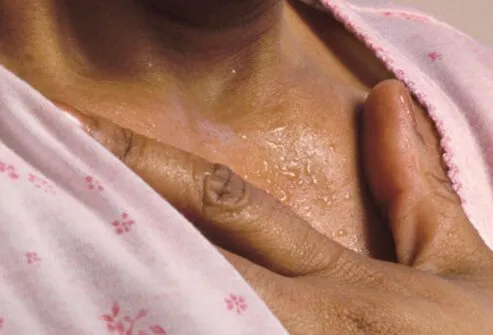
Hot flashes are a common symptom around the time of menopause. A hot flash is a feeling of warmth that tends to be concentrated around the face and neck. It can cause flushing or reddening of the skin in these areas as well as the chest, arms, or back. Hot flashes vary in their intensity and can be followed by sweating and/or chills. Night sweats, waking up drenched in sweat a night, may also occur during hot flashes. Hot flashes at night are a common occurrence for women experiencing the symptoms of menopause.
How Long do Hot Flashes Last?
Hot flashes last anywhere from 30 seconds to 10 minutes, and they may start before menstrual irregularities. Hot flashes may last up to 10 years, but 80% of women will not have any hot flashes after five years. The exact cause of hot flashes is unknown, but they are most likely linked to the hormonal and biochemical changes brought on by decreasing estrogen levels. Women can help reduce the symptoms of hot flashes by dressing in light layers, exercising regularly, using a fan, managing stress, and avoiding spicy foods.
Menopause Symptoms: Sleep Issues

Menopause-related sleep problems, including insomnia, are common during this transition in a woman’s life. Insomnia during the menopausal transition can be caused by night sweats, hot flashes that occur at night. Sweating and hot flashes can make it very difficult to sleep. The changes in a woman's estrogen and progesterone levels can also alter her sleep quality.
Relief from Night Sweats
The following tips can help you sleep well if you are having night sweats:
- Use lightweight bedding
- Use a fan in the bedroom
- Wear lightweight, cotton pajamas or gowns
- Use a damp washcloth to cool off your face, and keep one handy at bedside
Menopause Symptoms: Sex Problems

Menopause symptoms can affect sexuality. Along with menopause, women experience lower levels of the hormone estrogen. One of the effects of lowered estrogen levels is a decrease in blood supply to the vagina, which causes vaginal dryness. This can result in painful or uncomfortable intercourse. Water-soluble lubricants can help overcome this problem. If lubricants are not effective, contact your doctor. Vaginal creams and suppositories can be prescribed to ease vaginal dryness.
Another effect of hormonal changes is a change in libido, or sex drive. This may improve or worsen, but it is important to remember that other factors besides menopause can affect libido. Stress, sleep disturbances, medications, and anxiety can all affect sex drive. Your doctor can help you find ways to manage the changes in your sex drive if they occur.
Finally, although fertility ends at menopause, women of all ages are still susceptible to STDs, so safe sex is still important.
Menopause Treatment for Severe Symptoms

Hormone therapy is a menopause treatment option that can help alleviate many troublesome symptoms for some women. Low-dose oral contraceptive (birth control) pills are one option for perimenopausal women to help treat irregular vaginal bleeding and relieve hot flashes. Local vaginal hormone treatments can be applied directly to the vagina when treating symptoms of vaginal estrogen deficiency.
Examples of local vaginal hormone treatments include the vaginal estrogen ring, vaginal estrogen cream, or vaginal estrogen tablets (taken orally). Antidepressants have also been used to treat hot flashes associated with menopause. Other potential treatments that can help relieve symptoms include blood pressure medications, anti-seizure medications, and lifestyle modifications. Hormone therapy is not without its own risks, your doctor can help you weigh the risks and benefits of this treatment.
Menopause Treatment: Hormone Therapy
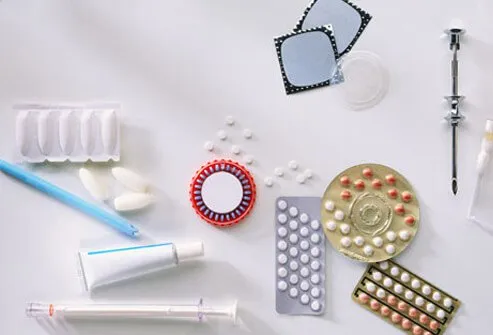
Hormone therapy can be used to control the symptoms of menopause. This treatment consists of estrogen, or a combination of estrogens and progesterone, administered via pill, patch, or spray. Long-term use of hormone therapy has been associated with an increased risk of heart attacks, strokes, and breast cancer, so it is recommended that the lowest dose of hormones that are effective be taken for the shortest time possible. There are a number of different types of prescription hormone therapies, and your doctor can help you find the best solution if you require this treatment. Discuss menopause hormone therapy side effects with your doctor to determine if this treatment is right for you.
Menopause Treatment: Bioidentical Hormone Therapy
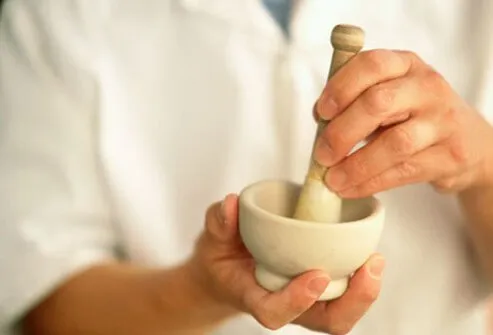
The term "bioidentical" hormone therapy has been used to refer to hormones derived from plants prepared individually for patients at compounding pharmacies. Some FDA approved prescription products are also "bioidentical" in the true sense of the word. Some doctors feel that compounded "bioidentical" hormone products are safer, but the US FDA does not approve these products.
Menopause Treatment: Natural Remedies

Are natural remedies are good for menopause? Many women try alternative treatments for menopausal symptoms. Certain botanicals, or herbal supplements, are advertised to treat hot flashes and other menopause symptoms. However, the US FDA does not regulate herbal supplements, so they may not always be safe.
Herbal Supplements That Have Been Suggested to Ease Menopause Symptoms
- Phytoestrogens
- Black cohosh
- Dong quai
- Evening primrose oil
- Ginseng
- Kava
- Red clover
- Vitamin E
- Wild yam
If you decide to try these remedies, or other herbal products, be sure to discuss this with your doctor. Some botanical or herbal supplements can interact with prescription drugs.
Menopause Health Risks
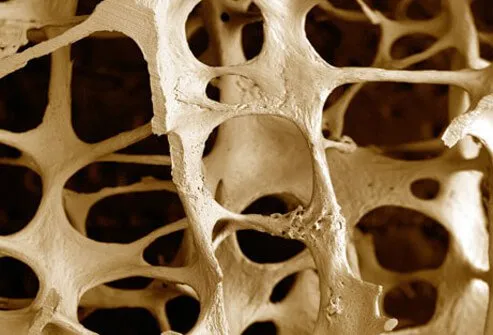
Late menopause health risks include a greater risk of heart disease and osteoporosis. Heart disease remains the number one cause of death for women in the United States. It is important to make sure blood cholesterol, blood pressure, and blood sugar are at normal levels. Cholesterol levels at the time of menopause may fluctuate, causing HDL (good cholesterol) to go down and LDL (bad cholesterol) to go up. These changes may result in heart attack or stroke. Declining estrogen levels may be partly to blame, but hormone therapy is not recommended for postmenopausal women to decrease these risks because it is associated with health risks of its own.
Menopause may also have an active role in osteoporosis, a condition in which bones become very weak and can break easily. Estrogen is important in building new bone. The decrease in estrogen during menopause makes women susceptible to osteoporosis. It is very important to build as much bone density as possible before age 30. Preserving bone density can be done by consuming foods high in calcium, such as milk and milk products. Vitamin D is also important because it helps the body absorb calcium.
Menopause and Good Nutrition

It's never too late to start living a healthy lifestyle. Regular checkups should include a measurement of cholesterol, blood sugar, and blood pressure. Be sure not to skip routine preventive screenings such as mammograms. Consuming plant-based foods that have isoflavones (plant estrogens) may slightly increase estrogen levels because the plants act like a weak form of estrogen.
Menopause nutrition therapy for some women may include soy protein. Soy is an example of a food that contains isoflavones and may relieve menopause symptoms. Women also tend to have low levels of calcium and iron. Getting enough calcium and iron is extremely important for women transitioning through menopause. You can work with your doctor to establish a plan for a healthy lifestyle including a nutritious diet, physical activity, and stress management skills.
Diet and Nutrition for Menopausal Women
The following are tips to better nutrition for women approaching or past menopause:
- Eat approximately 1,200 milligrams of calcium each day
- Eat approximately 9 milligrams of iron each day
- Eat approximately 21 milligrams of fiber each day
- Eat 1 ½ cups of fruit and 2 cups of vegetables each day
- Read and understand food labels
- Drink plenty of water
- Cut back on fatty foods
- Limit sugar and salt intake
Menopause and Weight Gain

Decreased levels of estrogen in women approaching menopause may cause weight gain. Lack of estrogen may also cause the body to use blood sugar and starches less effectively, increasing fat storage and making it difficult to lose weight. Regular physical activity is important at any age, and especially as a woman transitions to menopause.
During this time, a woman’s metabolism is slowing, making it harder to maintain or lose weight. Exercise can be one solution to help menopause-related weight gain. Aerobic exercise strengthens the heart, and weight-bearing exercises to maintain bone strength are two important components of an exercise program. Regular exercise can also help keep weight off and elevate your mood. Even if you weren't active before, you can start to increase your physical activity at any age.
Celebrating Menopause

Many women find that menopause is a time to celebrate a new phase of life rather than grieving for lost youth. After transitioning through menopause, women will not have any more periods or symptoms of PMS. They will also be able to have sex without worrying about pregnancies. Menopause should be used as a time to explore sources of pleasure and joy, fill yourself with positive thoughts, love yourself, and revive your sex life.
Menopause Tips
- Eat healthy
- Exercise daily
- Use lubricant during intimacy
- Make plans for dates and intimacy
- Talk to your doctor about any problems
Menopause & Perimenopause: Symptoms, Signs
This tool does not provide medical advice. See additional information: 
© 1996-2024 WebMD, LLC. All rights reserved.
